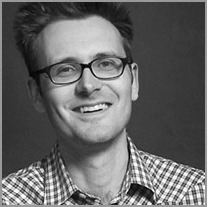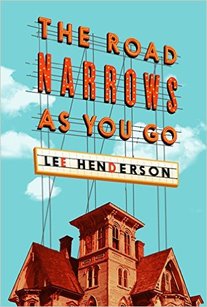 I've heard more than one person say Lee Henderson is about the world's coolest man. His books The Broken Record Technique and The Man Game are critically beloved prizewinners. He's also an artist and curator. I saw him read in Victoria in March, which confirmed the reputation that preceded him. Without even trying, he had the room in his very cool fist as he read from his new novel, The Road Narrows As You Go. I was pretty excited when he signed my copy and drew a cartoon dog on the title page. And even more excited when he cheerfully agreed to answer my questions here. His answers echo the way he talks, and like his book are smart, lively, generous. The new book is fat, almost Victorian-triple-decker fat. It hums and spits with energy and ideas--the gist involves Wendy Ashbubble, a young and secretly Canadian cartoonist, achieving highs of all kinds in 1980s San Francisco while trying to determine whether Ronald Reagan is her father. It's funny and sexy while being learned and sad (Jackie Collins meets Foucault, maybe?). It made me think about time. 1. Did you have any alternate titles for the book? What made you pick The Road Narrows As You Go? Did that come to you fully formed at the start, or later? Yeah, what happened was I wrote the book for six years under the title Orphans and then I think it was after I sent that draft to Nicole Winstanley, my editor, in fall of 2013, that I came up with a new title. I remember she once asked me in a phone call after I delivered the draft if I wanted to stick with Orphans and I said I had a new title, and I told her, and she was like, Yeah, let's go with that one. I also told her I wanted to rewrite the entire book from scratch -- so in four and a half months I wrote an entirely new draft, and that's the book. So there's a draft called Orphans that took six years and is radically, ridiculously different than The Road Narrows As You Go. 2. How did you start this novel--an image, a word, a general idea? Seems I usually get an idea about a location and work out from there. But this novel started in 2004 with the line "Say good-bye to the cartoonist," which rang in my head and still does. 3. How did you find the sense of an ending--did you know when to finish? Did the ending remain the same through different drafts? Well, this novel was always going to be some kind of weird palimpsest of different competing texts. I make allusions to them throughout the story, about four or five different stories. The main two are Barrie's novel Peter Pan and Antonioni's movie L'Avventura, and I folded these narratives into the 1980s world of junk bonds, AIDS, Satanic Ritual Abuse Repressed Memory Syndrome, and newspaper comics. So the ending of this novel was already written for me, I just had to figure out how to combine the ending of Peter Pan with the ending of L'Avventura using my characters. Most of the book is just a big giant echo of those two stories. With The Man Game, it was totally different. I had an ending in mind for eight years. I wrote it, submitted it to my editor, Barbara Berson, and she said the book was ready to publish, but needed a different ending. I almost lost my shit. How do you fix just the ending? It seemed impossible. But I also knew she was right. My ending was flat, it was inconclusive and basically it was a digression that avoided the real-deal ending I should have had. So I went on a long long walk. And just when I was about to give up I realized that it's all just fiction, if I can make up beginnings and middles, I can just as easily make up a new ending -- and then in a flash, a whole new ending came to me. 4. Could you choose a piece of music to go with the book? "Biological Speculation" by Funkadelic off their album America Eats Its Young. Early on I started to imagine the record collection my characters owned, and the whole Parliament-Funkadelic discography became very important to them and my vision of their lifestyle. 5. You've lovingly constructed the entire living world of this book--a joyous, tragic, energetic organism. Some of it is real (actual cartoonists make appearances), some invented. How was it to go through that divide? In particular it was very difficult to write about Art Spiegelman and Francoise Mouly -- two people I admire so much, and are so important to the history of contemporary comics because of what they did for the medium in the 1980s through Raw and Maus, etc. They had to be in the book, but those are the parts that took the longest to compose. I have more drafts of the dinner scene with them than anything else. I probably wrote it a good dozen times. It's one of the few scenes that stuck around from Orphans. 6. What was it about the 1980s Ronald Reagan that made you place him at the centre of the protagonist Wendy's dreams, shadowy as he is? Yeah, Wendy is pretty sure Reagan's her absentee father -- he's this big absurd clown-cartoon of a patriarch presiding over the unfettered greed and free-market decadence of the 1980s, and she loves him unconditionally. Her obsession with Reagan is part of how she sheds her Canadian identity. By making Reagan her father, in her mind, she's already half-American. He was witty and brave, he won the Cold War, he ate jelly beans and connected with regular folks, but he set back AIDS research by a decade, he encouraged a privatized prison system, he was responsible for the Iran-Contra deal, and he kickstarted the hypocrisy of the never-ending Drug War. Wendy is equally flawed, and she finds kinship inasmuch Reagan's strengths as his flaws. She's loved him ever since she was a child and watched him host General Electric Theater. 7. AIDS is the black backdrop to all the hilarity. I'm interested in how you decided to write about it this way. The 1980s were definitely amplified times. It was a loud, pinstriped, and shoulder-padded decade. It was a corporate decade that favoured the populist over the special interest. AIDS cut across the grain of '80s egotism. AIDS is the real subtext, the one subject that perhaps can't be avoided in any kind of proper portrait of the 1980s. And Reagan took the leadership role in the denial of AIDS. He refused to take AIDS seriously and his years of inaction cost America and the world millions of lives, for his voice could have made a big difference on the international stage had he found for AIDS the same kind of passion he found to end the Cold War. How I decided to create this sense of a black backdrop was to begin on the theme of AIDS in the first chapters and then let that horror hang over the rest of the story, so when the characters get really rapacious and decadent and ego-driven and self-absorbed in later chapters, their 80s attitude seems all the more absurd and tragic. AIDS also becomes the locus in the story for all the questions about what's real and what's not real, what's a fiction and what's a fact, what's a valid fear and what's just an ego on fire.
0 Comments
Leave a Reply. |
ALIX HAWLEYI'm the author of My Name is a Knife, All True Not a Lie In It, and The Old Familiar. Archives
February 2021
Categories |

 RSS Feed
RSS Feed
